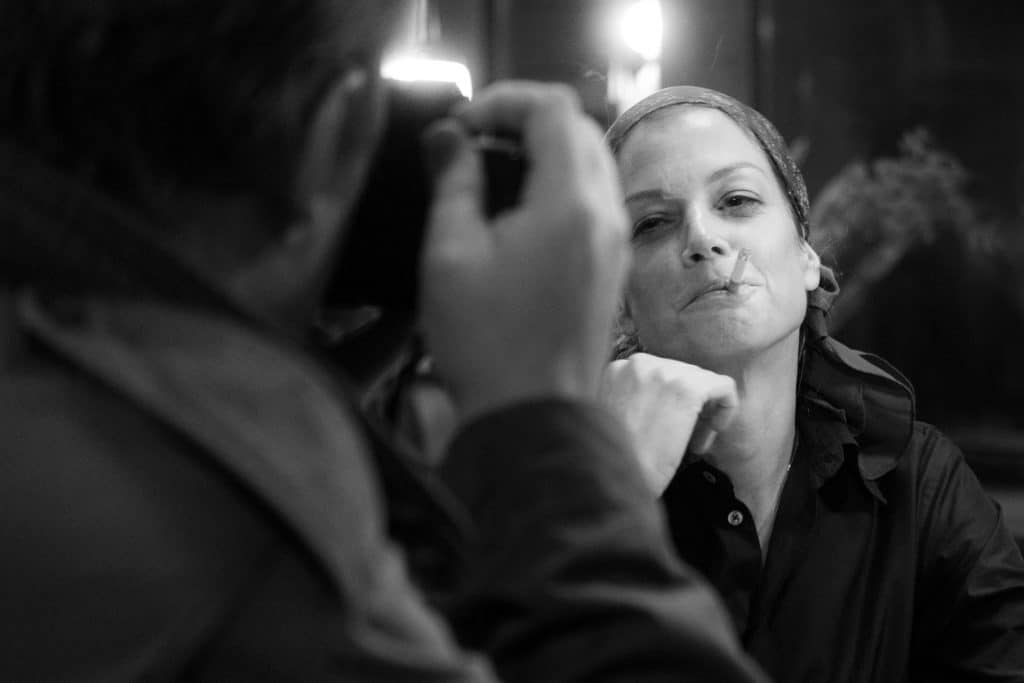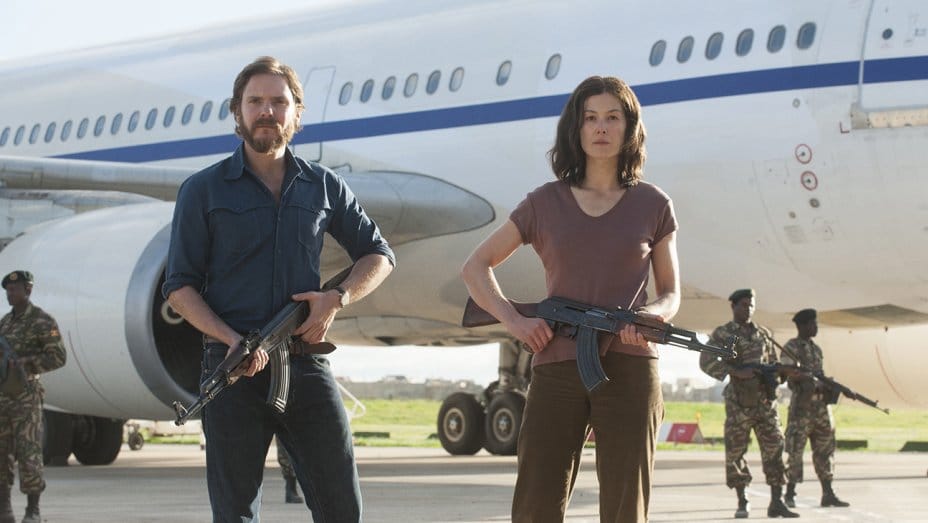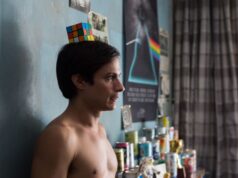Sixth-day coverage of the 68th Berlin International Film Festival with reviews of 3 Days in Quiberon, 7 Days in Entebbe, U – July 22 and Hard Paint
3 Days in Quiberon (3 Tage in Quiberon)
Biographical films about the private lives of stars and famous people have always had a curious appeal for moviegoers, who seem to delight in the prospect of looking through their masks and seeing if there is an actual human being underneath. While many biographies recount someone’s entire life, others just describe episodes, moments, or fragments of real-life stories, which can sometimes feel like projects born out of pure whim to exploit the titillating side of fame with its vices and scandals. It is the case of tabloid-like films such as My Week with Marilyn (2011), Hitchcock (2012) and Grace of Monaco (2014), to name only a few recent ones.
Emily Atef’s 3 Days in Quiberon has the perfect material for an interesting character study about alcoholism and depression, as it dramatizes the three days in 1981 when German-French actress Romy Schneider granted an interview to Stern magazine reporter Michael Jürgs in Quiberon, France. Detoxing at a spa hotel by the sea, Romy (Marie Bäumer) is visited by long-time friend Hilde (Birgit Minichmayr), who is a restorer from Vienna. When Jürgs (Robert Gwisdek) and photographer Robert Lebeck (Charly Hübner) arrive, Romy wants to be done with the interview as quickly as possible, but soon things change once she begins to expose herself and the woman behind the celebrity.
Shot in black and white with a high contrast that gives the film a similar aspect to the famous photos that Lebeck took of Schneider — as well as the use of handheld camera and a smaller depth of field to bring us closer to the characters — 3 Days in Quiberon wants to probe into the mind of the star of Sissi (1955) and draw an intimate portrait of an unhappy woman who was painted as naïve and impulsive by the German press but insists she is not the roles she plays. Romy is seen as a source of public scandal, and her 14-year-old son doesn’t want to live with her anymore. She claims she is doing this — the rehab and trying to quit the drinking and pills — for him.
Jürgs tells her the interview could be her chance to show the world her side of things, but it becomes obvious that he just wants to exploit the weakness of an unstable woman, getting her drunk so that she will open up. Depicted as a cynical and slick journalist, Jürgs never refrains from provoking her with malicious questions (“Did you take seriously his depression?” he asks, referring to her ex-husband who committed suicide only two years earlier). But while the first interview is at least compelling, the ones that follow are nearly painful to watch. There is a nice criticism here on this kind of sensationalist “journalism,” but things become repetitious and redundant, with an artificial, one-note dynamic playing over and over.
As the film quickly plunges into silly discussions whose sole purpose is to create cheap drama (like those between Romy and Hilde), the impression that remains is how confused this woman is, changing her mind at every second and so eager to trust two manipulative men. It is true that Marie Bäumer embraces many facets of the actress, from radiant to vulnerable and impulsive, and I love the moment when Romy gasps when hearing Hilde tell her about a painting of Narcissus. But it’s only pathetic that it takes a man to make her rethink her life and convince her she should live it to the fullest — even if that would lead her to her grave a year later.
7 Days in Entebbe
On June 27, 1976, an Air France flight en route from Tel Aviv to Paris was hijacked in Athens by two German members of left-wing group Revolutionary Cells and two members of the PFLP (The Popular Front for the Liberation of Palestine). They took the plane to Entebbe, Uganda, where they held over a hundred hostages (including 83 Israeli citizens) and demanded the release of 40 Palestinian prisoners from Israel. After much deliberation, the Israeli government finally decided to send an elite commando unit to raid the place and rescue the hostages in an operation that already inspired three films, including an Israeli one.
If a new version could sound like something made to praise the military superiority of Israelis over terrorists, this couldn’t be farther from the truth. Beginning with a disclaimer that makes it clear that anti-Zionist revolutionaries may be “terrorists” for some but considered “freedom fighters” by others, 7 Days in Entebbe reconstructs the seven days when the hostages were held in Entebbe with the support of Ugandan dictator Idi Amin, but the focus is on the characters — more specifically the two Germans, Prime Minister of Israel Yitzhak Rabin, Minister of Defense Shimon Peres, an Israeli soldier and his girlfriend.
Played by Daniel Brühl and Rosamund Pike, the Germans are portrayed as idealists who want to change the world, and it isn’t hard to sympathize with their reasons to hijack a French airplane, since, as they point out, the French were supporters of Israel and collaborated with Mossad. Besides, they believe that militant Ulrike Meinhof did not commit suicide but was murdered in prison, which serves as a compelling motivation for their actions — even if believing in a cause means having to make hard decisions. You can’t vacillate, but soon Brühl’s character begins to feel guilty after an encounter with an old Jewish woman, while Pike’s has doubts.
And if Israeli soldier Zeev (Ben Schnetzer) believes his relationship with his girlfriend can only work if she joins the army (she prefers dancing instead), we also follow the efforts of Prime Minister Rabin (Lior Ashkenazi), who defends diplomacy (“One day we have to talk and make peace,” he says), and Minister Peres (Eddie Marsan), who launches a rescue operation in secret despite peace negotiations being in progress. The politicians even discuss Israel’s investment in defense to ensure their survival, and more interesting is seeing how politics are also about those in charge taking credit for decisions made by others.
However, one problem I have with the film is the dialogue. It is nice to see, for instance, the Arabs refer to the Israelis as “the Jews,” a clever detail that indicates religious motives behind their actions. But on the other hand, the dialogue can be quite cheesy (“If you think you have no choice, you are a hostage too”), expository (“We will stop at nothing until the hostages are all safe”) and even make a revolutionary fighter sound stupid (“The Arabs are a socialist people.”) Worse than that is how director José Padilha, who has already shown some disregard for language and accents before, decided to have all Israelis speaking English, even among themselves for no reason.
At least the film is compensated by an explosive and fantastically edited ending that combines the sequence of the raid with an intense performance of Echad Mi Yodea, choreographed by Ohad Naharin. The four pivotal characters — the Germans, Zeev and his girlfriend — are brought together for the final act, and what 7 Days in Entebbe states is clear: no matter whether you are fighting for a cause, defending your nation or wanting to live your art, you must embrace it; for those who lack conviction are only doomed to fall.
U – July 22 (Utøya 22. Juli)
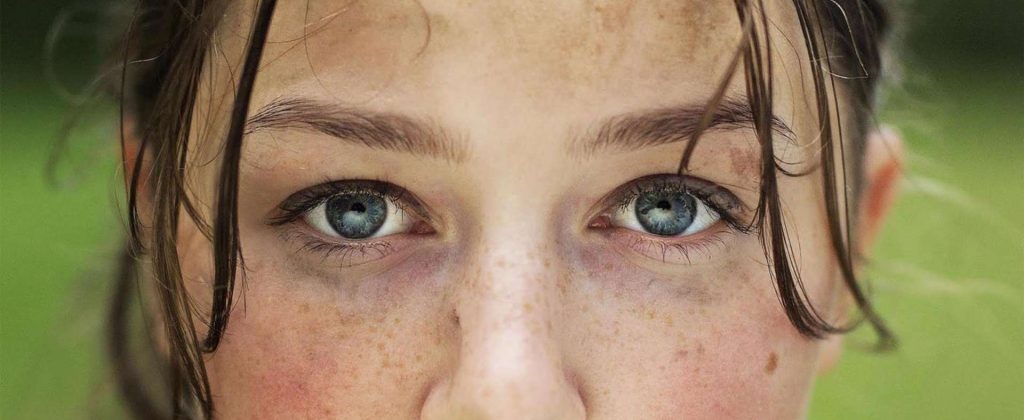
After the screening I attended of U – July 22 at the Berlinale, director Erik Poppe went up on stage to say a few words about his film and what had brought him to this project. One thing he told us was that, three years since the terrorist attack that took place at the summer camp of Utøya, Norway, in 2011, public interest had shifted to trivialities (including the conditions and possible violation of the attacker’s human rights in prison). After a while, people stopped talking about what happened, and the incident started to fade from their minds. Poppe then decided to remind us of it by putting us in the victims’ shoes, in an effort not only to let us grasp the fear and terror but also to find some sort of closure.
Beginning with a brief footage of the detonation of a bomb that killed eight people in Oslo on July 22, 2011, the film then moves to the island of Utøya, where only a couple of hours later the same attacker — a heavily-armed right-wing extremist — proceeded to shoot at 500 teenagers of the youth division of the Norwegian Labor Party attending the camp. The massacre lasted 72 minutes, claimed the lives of 69 victims and left 66 wounded, in that which became the most traumatic terrorist attack in Norway and made evident how unprepared the authorities were in handling a situation that no one could ever imagine to see in that country.
In the island, we meet 19-year-old Kaja (Andrea Berntzen), who is on holiday with her sister Emilie. She looks us straight into the camera and says she will tell everything “so that [we] can understand.” We quickly realize she is not exactly breaking the fourth wall and addressing us but in fact speaking to her mother on the phone, which is a clever moment that immediately pulls us in before the camera goes on to follow her in a breathtaking single take that places us right beside her the entire time. Everything happens in real time as we meet these characters, participate in their barbecue and watch them comment on what just happened in Oslo.
The conversation is casual, and there is a Muslim guy who fears the attack in Oslo will increase the hatred towards Muslims in Norway. The camera remains close enough to them like a character itself, always careful not to appear reflected on any surfaces. Some details make everything feel even more realistic, like a guy who shows up to ask someone about a deck of cards. Once the shootings begin, it is almost as if we are there, as the camera is kept at the actors’ height, bending, crawling, running down hills, or leaning against walls, which increases the tension and keeps us in the dark just like all of those people.
And this is not the kind of situation you can simply escape or run away from. Shots are coming from everywhere and in every direction. The only thing you can do is hide and wait — for the police or any solution to show up. Being cornered is the opposite of action, but we are driven by the panic and terror thanks to the actors too (and Berntzen is excellent). Even so, this is the kind of film that always needs to offer more to sustain the tension, and what happens is that sometimes it loses momentum, lingering for too long on situations that could have been more effective if made shorter (like when Kaja tries to help a girl who just got shot).
In fact, U – July 22 takes an enormous time before showing us the first dead person, which ends up diluting the urgency of what we see — even if it balances that with an effective sound design, visual effects that shock us as we watch a girl turn pale when she dies, and moments worthy of Sergei Dvortsevoy that are captured by pure chance when least expected, like an indifferent mosquito on someone’s skin. The film also suffers from artificial conversations (and singing) that eliminate the intended realism, but in the end, it is still a devastating dramatization that does remind us that something this horrible can happen to anyone.
Hard Paint (Tinta Bruta)
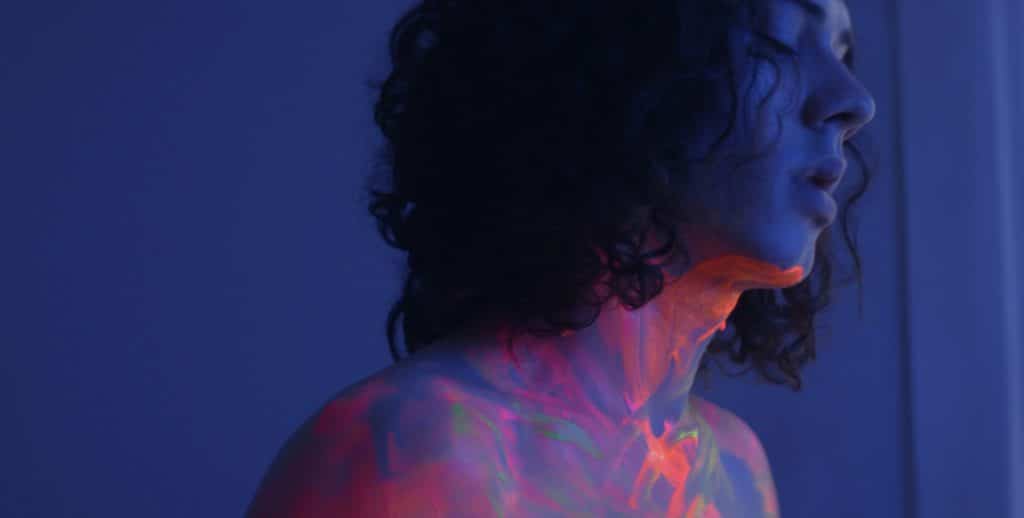
Brazil is an incredibly homophobic country. According to LGBT association Grupo Gay da Bahia, at least 445 LGBT Brazilians died victims of homophobia in 2017, an increase of 30% compared to 2016. This would roughly mean that every 19 hours, an LGBT is murdered or commits suicide because of LGBT-phobia, making it the country where most LGBTs are murdered in the world according to international human rights agencies — yes, more than in the 13 countries of the Middle East and Africa where death penalty against LGBTs is a reality.
Also grotesque is how most of those hate crimes are carried out with utmost cruelty, with about half of the victims murdered by strangers, one-night-standers or clients if the victim is a sex worker. The implications are quite disturbing, as they indicate a society in which men can be so ashamed and disgusted of feeling any sort of attraction towards other men that they would take it out on anyone who reminded them of what they hide inside. It is not just bullying against minorities but a lot of self-hate in a conservative place that encourages you to castrate yourself.
Written and directed by Filipe Matzembacher and Marcio Reolon (Seashore), Hard Paint doesn’t want to examine what is behind homophobia as much as its consequences for a gay young man who feels lost in a place like Porto Alegre — a city depicted as a dark purgatory that everyone eventually leaves. Those who stay are lifeless shadows, or silhouettes on their windows at night. The protagonist is Pedro (Shico Menegat), who earns a living by performing in front of his webcam, covered with neon paint under an ultraviolet light, for a thousand faceless strangers who hide behind their comfortable anonymity and colorful nicknames in chat rooms.
After a homophobic incident, Pedro is facing serious criminal charges and trying to deal with the fact that his sister Luiza (Guega Peixoto) is moving away. And in one occasion while performing, Pedro is asked out on a date with an anonymous married man who would like to “take care of him.” It is the kind of proposition that should make any gay man cautious in Brazil, especially someone as shy as Pedro, who is used to being judged and bullied. Whenever he tries to go out on his own for only five minutes, it becomes a torturous eternity. Everyone seems to look and judge him, with cacophonous sounds following his discomfort.
Pedro also discovers he has a webcam imitator and agrees to go on a date with him, and the meeting with this guy, Leo (Bruno Fernandes), has surprising consequences for both. The most impressive is seeing Pedro (who has been pushed his whole life into becoming antisocial by an essentially homophobic environment) open up to this new person about how he uses his paint as some sort of mask — a mask behind which he can be free to dance and literally shine in the dark. Both Menegat and Fernandes are fantastic, later sharing a beautiful love scene full of affection and intensity.
Leo, by the way, gets to say the most touching line (“I only wanted to be there that night to wipe the blood off his face”), and Hard Paint even discusses how Brazil’s conservatism allows a judge to reach a verdict based on family values. Besides, the film can be quite tense as well, like with a sex date scene involving a stranger or when Pedro hesitates to make a devastating decision. But in the middle of all this darkness, it ends with a striking (and spectacular) last scene that perhaps argues we don’t need masks to be whatever we are or want to be.


